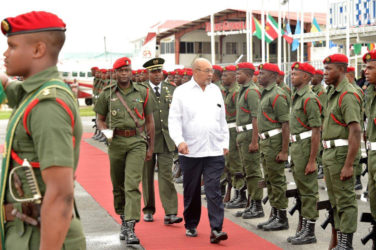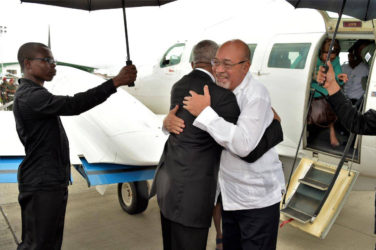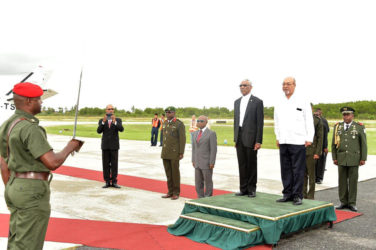The Guyana-Suriname Co-operation Council is to be resuscitated following a lightning visit here yesterday by Paramaribo’s President Desi Bouterse.
The council, whose work will be supported by a special envoy operating between the two capitals, will have as its main responsibility the implementation of agreements reached.
A one-day engagement between Presidents David Granger and Bouterse saw the two heads of state agree that technical officials from Guyana and Suriname will meet to discuss issues in relation to the protection of the environment, agricultural trade, tourism and investment as well as cross-border activities, through their respective committees.
Also agreed was the appointment of a high-level representative, who will according to Granger be engaged in “shuttle diplomacy” as part of the larger mechanism to operationalize bilateral agreements between the two Caricom states and remove obstacles to economic integration.
Yesterday’s meeting was the second such engagement between the two heads of state, the first meeting occurred in July when Granger travelled to Nieuw Nickerie. Bouterse, speaking at a joint press conference through an interpreter, explained that at the July meeting some 10 items were agreed to in the environment, tourism, oil exploration and investments sectors. He stressed that six months after these agreements were reached very little progress has been made in operationalizing them.

“We are about half a year further, six months further and if we look back we are not satisfied with what has been done with these issues so that’s not good,” he said.

It is for this reason that a results-based mechanism which takes into consideration time frames has been put in place. A joint communique from the two leaders explained that this mechanism was the joint co-operation council.
In the communique issued at the end of the trip, both leaders agreed that full advantage should be taken of the opportunities for combining human and capital resources to further the economic and social development of the peoples of Guyana and Suriname.
Bouterse later explained at a press conference that “we have agreed to a mechanism in which the different issues that will be brought up or have been brought up per sector can be discussed and that these will be implemented and monitored within a certain time-frame and then reported back,” before noting that the special envoy who would report to both Presidents is key to the mechanism.
“That is the most important outcome of the meeting that we have agreed on a method of moving forward into the future to ensure that problems are solved, it is not a talk-shop,” Granger added.
The special envoy is expected to have easy access to both Presidents, barring the need for them to meet to address issues that require their “urgent personal attention.” The actual terms of reference of the special envoy is still to be decided but President Granger is certain that this individual will at least have the rank of an ambassador and hold official status in both capitals. This status is expected to facilitate a smooth form of “shuttle diplomacy” between Paramaribo and Georgetown where any “bottleneck” will “be cleared up much more quickly”.

While Bouterse made sure to mention several sectors of focus, the Guyanese leader repeatedly mentioned economic issues such as the hassle-free movement of Guyanese minibus operators traversing the Guyana/Suriname ferry and access to Surinamese airports for Guyanese air carriers. Granger stressed that these matters would be taken to the Co-operation Council for speedy resolution.
Asked whether the Guyana-Suriname border issue was discussed, President Bouterse said that it is a sensitive issue for both parties and informed that both countries have their respective instruments to address this matter. “We know that we have this issue between us, but in spite of that we both have the responsibility to collaborate and co-operate with one another in areas which we have identified and which we will identify, in order to bring about sustainable development in both of our countries,” he clarified.
One such area of co-operation is the proposed building of a bridge across the Corentyne River.
Bouterse noted that his delegation has provided the Granger administration with a background to the proposed project in which both states have expressed interest.
He reminded that in 2013, Suriname had signed a memorandum of understanding with a Chinese company to build the bridge. At the time Guyana granted its no-objection.
Bouterse however noted that this agreement has not yet been operationalized since no agreement has been reached as to the location of the Bridge nor has the Chinese company completed a feasibility study or an environmental impact study.
He explained that along with China the European Union and Brazil have expressed an interest in funding the construction of this bridge.
In the case of the EU the bridge represents an opportunity to link all of South America and would be constructed along with one linking Suriname to French Guiana.





